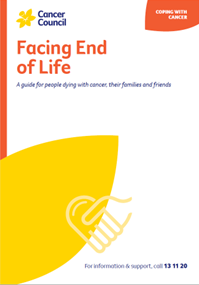- Home
- Cancer Information
- Advanced cancer
- Facing end of life
- Practical concerns
- Saying goodbye
Saying goodbye
Knowing you will die offers you a special opportunity – the chance to say goodbye to those you love and care about. It’s sad and difficult, but some people say they feel lucky that they’ve had the time to prepare.
Learn more about:
Saying goodbye
Knowing you will die offers you a special opportunity – the chance to say goodbye to those you love and care about. It’s sad and difficult, but some people say they feel lucky that they’ve had the time to prepare.
Saying goodbye is a personal experience, so do what is right for you. When you feel you are ready, consider how you will say goodbye. You might set aside a time to talk to each person individually. Or, if you are physically up to it, you might have a gathering for friends and family.
If you have children or grandchildren, you could ask that any letter or recording is to be given to them at a specific age or time in their life. You (or your friends) could also create a slideshow or scrapbook of special photos. A memory box can be another special keepsake for your family. You may find it hard to think about a time when you won’t be there for your children, but leaving behind mementos can be helpful and comforting for them. If your children are very young, they’ll understand your words and sentiments when they’re older.
If you have a pet, you may want to consider who will care for them. A family member or friend may want to look after them, and you could consider leaving money in your will to cover this care. You could also look on local online pet message boards or talk to your local RSPCA to see whether they have a program for rehoming pets.
Celebrating your life
Knowing you are going to die gives you a chance to reflect on your life and all that you have done, and to think about your legacy. You could talk with family and friends about the special times you have shared together.
You might like to share some of your belongings or a small keepsake with family members and friends as a permanent reminder. You could also write letters or stories of your life, record special memories, make a short film or video featuring you with your friends, review or arrange photo albums, document your family’s history or family tree, make a playlist of favourite songs, gather treasured recipes into a cookbook, or create artwork or music. There are also paid and voluntary services that can help you make a record of your life.
Making a memory box
A memory box is a collection of keepsakes for your family. You can put in anything that is meaningful to you, but some suggestions include a:
- treasured photo
- video of a family event
- special birthday card
- favourite cap, tie, scarf or other item of clothing
- list of shared memories
- lock of hair
- family recipe
- pressed flower from your garden
- bottle of your favourite perfume
→ READ MORE: Caring for someone who is dying
Podcast: Living with Dying
Listen to more episodes of our podcast for people affected by cancer
More resources
Prof Jane Phillips, Head, School of Nursing and Professor, Centre for Healthcare Transformation, Queensland University of Technology and Emerita Professor Palliative Nursing, University of Technology Sydney, NSW; Prof Meera Agar, Palliative Care Physician, Professor of Palliative Medicine, University of Technology Sydney, IMPACCT, Sydney, NSW; Sandra Anderson, Consumer; A/Prof Megan Best, The University of Notre Dame Australia and The University of Sydney, NSW; Prof Lauren Breen, Psychologist and Discipline Lead, Psychology, Curtin University, WA; David Dawes, Manager, Spiritual Care Department, Peter MacCallum Cancer Centre, VIC; Rob Ferguson, Consumer; Gabrielle Gawne-Kelnar, Counsellor, Psychotherapist and Social Worker, One Life Counselling & Psychotherapy, NSW; Justine Hatton, Senior Social Worker, Southern Adelaide Palliative Services, Flinders Medical Centre, SA; Caitlin MacDonagh, Clinical Nurse Consultant, Palliative Care, Royal North Shore Hospital, Northern Sydney Local Health District, NSW; McCabe Centre for Law and Cancer; Palliative Care Australia; Belinda Reinhold, Acting Lead Palliative Care, Cancer Council QLD; Xanthe Sansome, National Program Director, Advance Care Planning Australia; Kirsty Trebilcock, 13 11 20 Consultant, Cancer Council SA.
View the Cancer Council NSW editorial policy.
View all publications or call 13 11 20 for free printed copies.
Need to talk?
Support services
Coping with cancer?
Speak to a health professional or to someone who has been there, or find a support group or forum
Need legal and financial assistance?
Pro bono services, financial and legal assistance, and no interest loans
Cancer information
Advanced cancer
Information for all stages of advanced cancer, from the initial diagnosis to palliative care and grief
Talking to kids when cancer won’t go away
A starting point for talking to children if someone they love has advanced cancer

